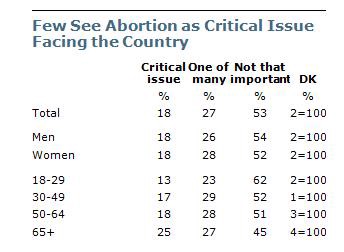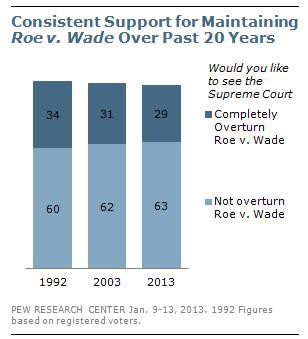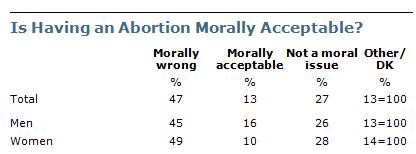Ross Douthat on Abortion: A Case of Op-Ed Malpractice

I feel for Times op-ed contributor Ross Douthat — at times. He has to work extra-hard to communicate ideas about religion to atheists and Christians alike, and also to lock down his cases against hedonism and “pre-marital sex” and abortion, consulting as he does for a liberal paper in a liberal town. And as a religious person, he has to both obey and articulate his faith’s professed principles of empathy, even while being a polemicist. This is a sticky situation! So it’s reasonable that he sometimes succeeds at one but fails at the other.
This weekend, however, he’s gone too far. He’s mangled and misrepresented a major study to his own ends, and relied upon the work of academics that publish in far-right think tank journals, obscuring their bias along the way.
Douthat’s column is his latest effort to make the case against abortion. His brief here is at least surprising: he claims that the idea, put forward by feminists, that the anti-abortion forces are also traditionalists is wrong. “Most anti-abortion Americans today are also gender egalitarians,” he writes. This is not even conceivably true, but it’s vaguely stated, so let’s let it pass. Let’s focus on just two things.
His whole argument here is based upon the work of “Jon Shields of Claremont McKenna College.” A professor at a tiny California liberal arts college? Oh then, surely this is going somewhere unusual, right?
Shields got his Ph.D. in politics in 2006 from UVA. He studies conservative movements and religion. He is the author of, among other things, What Abortionist Killers Believe. This is a fascinating and strange article: an important history of the creation of the abortion blockade movement. It’s a good read for liberals, because it feels fascinatingly alien. (Writing about abortion clinic bombings: “These early attacks, however, were successfully timed to avoid human casualties.” How thoughtful of them!)
Here is a very interesting combination of sentences:
Then in 1994, a new federal law increased the penalties for blocking access to clinics. Now isolated, the seriously violence-prone were left to their own worst impulses. Violence escalated. For the first time, abortion providers were targeted for execution.
I see. Yes, the laws that allowed women to actually enter clinics to receive a legal medical procedure: those were what directly led to religious terrorists killing doctors. A terrific — and subtle! — argument.
In the end, Shields comes out against murder, a brave stance. “Its many Catholic and Protestant participants, moreover, obviously do not understand their faith to require them to kill doctors or nurses — or mothers or fathers — involved in the great evil of abortion.”
The conclusion of the paper from which Douthat is quoting is far more interesting. The abortion conflict, Shields writes, is “perhaps the only conflict in American history in which both sides regard themselves as human rights activists who are expanding the frontiers of human freedom.” (I don’t really agree with this, but Shields is treating the war over gay marriage and anti-gay discrimination as already over — which may be true.)
Also last year, Shields published with the Witherspoon Institute, work that Douthat has clearly read. The Witherspoon’s house organ is edited by a fellow of the Heritage Foundation, a person who also wrote amicus briefs in defense of Prop 8 and in defense of DOMA. Its managing editor chaired a Right to Life conference. The Witherspoon Foundation’s president is Luis Tellez, who is on the board of the American Principles Project, who have hands everywhere. Tellez is an anti-gay marriage activist.
At the Witherspoon’s right-wing organ, Shields wrote:
Study after study finds strong emotional reactions to abortion provision even in clinics that cultivate feminist cultures and community. Studies of such clinics consistently find that those who perform second- and third trimester abortions feel powerful and unexpected feelings of sympathy for the fetuses they destroy. Some are even compelled to doubt the justice of abortion itself.
This is a known quantity. There is a reason that women and abortion professionals have feelings about abortions (or “fetuses they destroy,” to use his language). That is because they are on the front lines of hard choices. Few women find abortion a pleasant way to spend a Tuesday afternoon. Few medical professionals do not sympathize with their patients. This conservative miscasting of the empathy of abortion providers is particularly offensive.
Similarly, Douthat writes:
…public opinion on the issue doesn’t break down along the gendered lines that many liberals expect — why more women than men, for instance, told the latest Pew survey that abortion was “morally wrong” and (in smaller numbers) that Roe should be overturned.
Here is the summary of that Pew survey, by the way.

Right. Support for Roe v. Wade has strengthened since 1992. Nearly 2/3rds of people surveyed said the case should not be overturned.
And of course there is conflict about abortion among women. That stems as well from a conflict between religious teaching and actual practice: “Thirty-seven percent of women obtaining abortions identify as Protestant and 28% as Catholic.”
But as for the “morally wrong” question, divided by gender….

This falls just in the safe zone of his assertion, with a 2.9% sampling-related error range.
(And it should be noted: 28% of women also said that having an abortion was not a moral issue at all. Most fascinating, there are some outliers: 15% of all people surveyed who favor overturning Roe v. Wade say that it is not morally wrong to have an abortion.)
But most importantly. When Douthat says that more women than men say that Roe should be overturned, those numbers are: 30% for women, 29% for men.
Pew went so far as to note, contra Douthat, that: “There is no gender gap in opinions about Roe v. Wade.”
That Douthat would exploit a result well within the range of sampling error — directly contradicting Pew’s instructions about how to read the data — as a backbone of his case is malpractice.
And just for reference: “White evangelical Protestants are the only major religious group in which a majority (54%) favors completely overturning the Roe v. Wade decision.” As well, a majority of respondents said that abortion was not even important to them overall. “The percentage viewing abortion as a ‘critical issue facing the country’ fell from 28% in 2006 to 15% in 2009 and now stands at 18%.”
Writing this survey backwards is one of the tactics that Douthat must use. It is all he has left: Dependent on work welcomed by a baleful conservative publication, and obviously misrepresenting a major study. A review of his work will turn up more of his dancing on the edge, and surely over it.
What has always been the worst about Douthat is that his conclusions, supported by whatever he can scrape together, have rarely been true. “The pro-life cause has proved unexpectedly resilient,” writes Douthat. That is not particularly true. At all! Plagued by the violent fringe documented by Shields, the pro-life cause alienated its potential members and allies who did not believe in bombing clinics and murdering doctors. And along the way, the anti-abortion movement alienated the middle ground of Americans who felt — or still feel! — a reasonable discomfort with abortion. This, I believe, is the story behind the Pew data. The extreme right’s tactics failed. Those who defend them and those who misrepresent them — Douthat and Shields both — surely know it. That may be why they fight fast and loose with facts.
